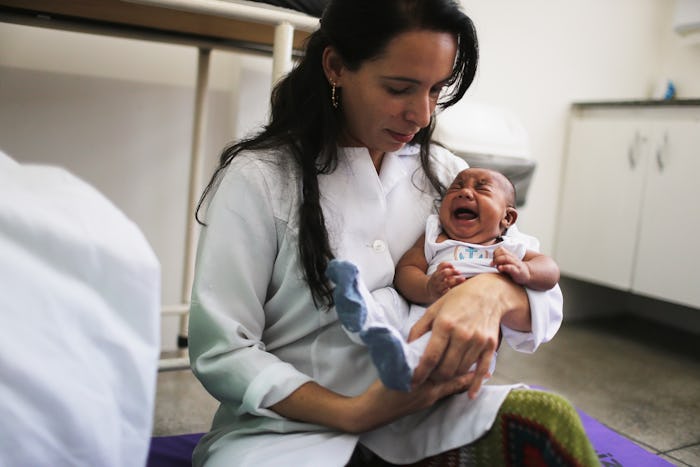Life

Does Zika Pass Through The Placenta? Pregnant Women Need To Be Cautious
With summer fast approaching, pregnant women in the United States have more than swollen feet to worry about: experts are concerned about the spread of Zika virus reaching the U.S. While most adults who contract Zika are asymptomatic, Zika can be devastating to fetal development, causing birth defects such as microcephaly, or even miscarriage. That's because, unlike other flaviviruses such as yellow fever and West Nile, Zika can pass through the placenta, which normally acts as a barrier between the circulatory systems of a mother and child, according to Forbes.
Researchers at Emory University School of Medicine have a theory as to how Zika manages to pass though the placenta: they believe that it can "hide" in host cells, according to Forbes. After growing placental cells in a lab using tissue donated from healthy women, the researchers infected the cells with Zika. While dead cells normally indicate to the immune system that an infection is present, the researchers observed that Zika didn't kill most of the cells, thereby evading detection. Replicating within immune cells (called Hofbauer cells) could be how Zika is able to cross the placental barrier that normally protects fetuses from other viruses. Assistant Professor of Pediatrics Mehul Suthar, who led the study, told Forbes that some cells were more susceptible to infection, and figuring out what causes that susceptibility "could allow the design of preventive measures, and eventually antiviral therapies."
Unfortunately, we're still a ways off from any sort of therapy, vaccine, or cure for Zika, so the best line of defense is still avoiding infection in the first place. This means avoiding the bite of the Aedes aegypti mosquito, which is prevalent in South and Central America, but may make its way as far north as Connecticut in the warmer months. Air conditioners, window screens, and mosquito netting can provide a physical barrier, and insect repellent is also recommended, including those that contain DEET, which is safe for pregnant women to use. Zika can also be transmitted through semen months after infection, so pregnant women don't get to take a break from condoms.
Since Zika only presents with symptoms in about 20 percent of infected patients, the Centers for Disease Control recommend testing for pregnant women in Zika-affected areas, both at the beginning of pregnancy and halfway through gestation. Those who are infected should have frequent ultrasounds to monitor the fetus. Not every pregnant woman infected with Zika will necessarily pass the virus to her baby; in February, the CDC reported that at least two pregnant U.S. women infected with Zika eventually gave birth to healthy babies. Still, there's no such thing as being too careful.